Sony Interactive Celebrates Earth Day 2024
An update on our commitments to Sony Group's Road to Zero plan
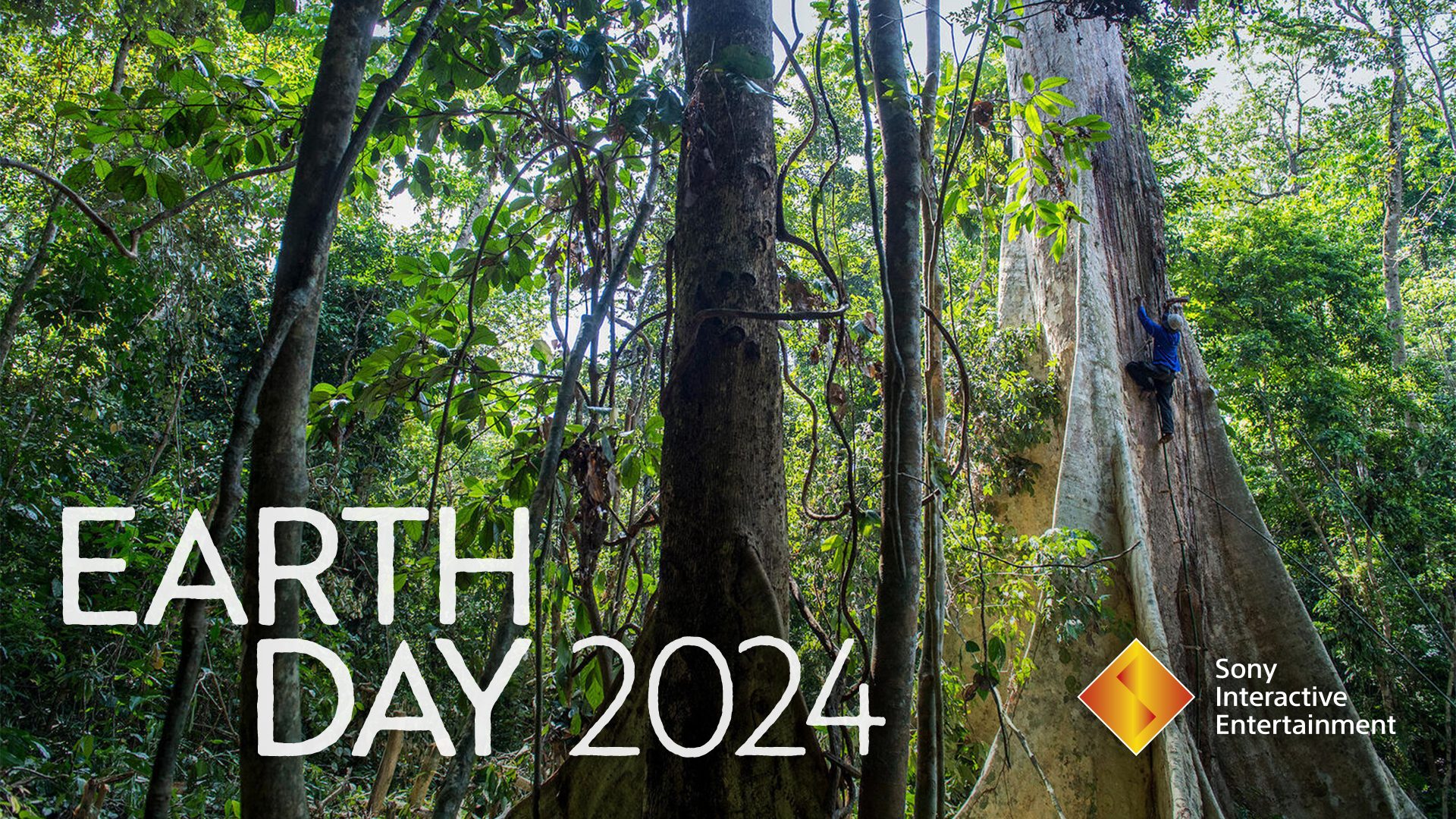
Ahead of Earth Day, held on April 22, we would like to share our annual progress in addressing Sony Interactive Entertainment (SIE)’s environmental impact. SIE remains committed to Sony Group’s Road to Zero plan, which sets targets across four key perspectives; climate change, conserving resources, controlling chemical substances, and promoting biodiversity. Here are some updates on our key initiatives over the last 12 months:
SIE continues to contribute to the United Nations Playing for the Planet alliance. We have pioneered an application, Climate StationTM, in collaboration with the UN Environment Programme (UNEP). Climate Station uses virtual reality technology to allow people to view, interact with, and understand complex climate data to raise awareness about climate change. We will provide more details on Climate Station in the near future. SIE demonstrated Climate Station at COP 28 in Dubai and the United Nations Environment Assembly in Nairobi (UNEA-6), and are collaborating with researchers at the University of Oxford to complete a study of how leaders, policymakers, and stakeholders perceived this technology and its potential applications.
In 2023, following our efforts the previous year, we sent notifications to gamers through different channels, including the PlayStation console and email, to support the UN Play4Forests campaign. Over the past two years this has led to an additional 70,900 signatures, over half of the total 128,700 pledges made to the cause to date.
We continue our mission to promote action on biodiversity conservation through our Aloy’s Forest project. In 2023, we reported on the progress of our conservation partners in global restoration projects through a collaborative video update. This initiative is part of our commitment to the United Nations Playing for the Planet Alliance, supported by the United Nations Collaborative Programme on Reducing Emissions from Deforestation and Forest Degradation in Developing Countries (UN-REDD), to raise awareness on biodiversity.
In 2024, we are excited to announce the further expansion of Aloy’s Forest around the world, by sponsoring new reforestation and conservation projects with the Arbor Day Foundation and World Wildlife Foundation (WWF). Our support will help fund the following vitally important programs:
Arbor Day FoundationOpens an external website
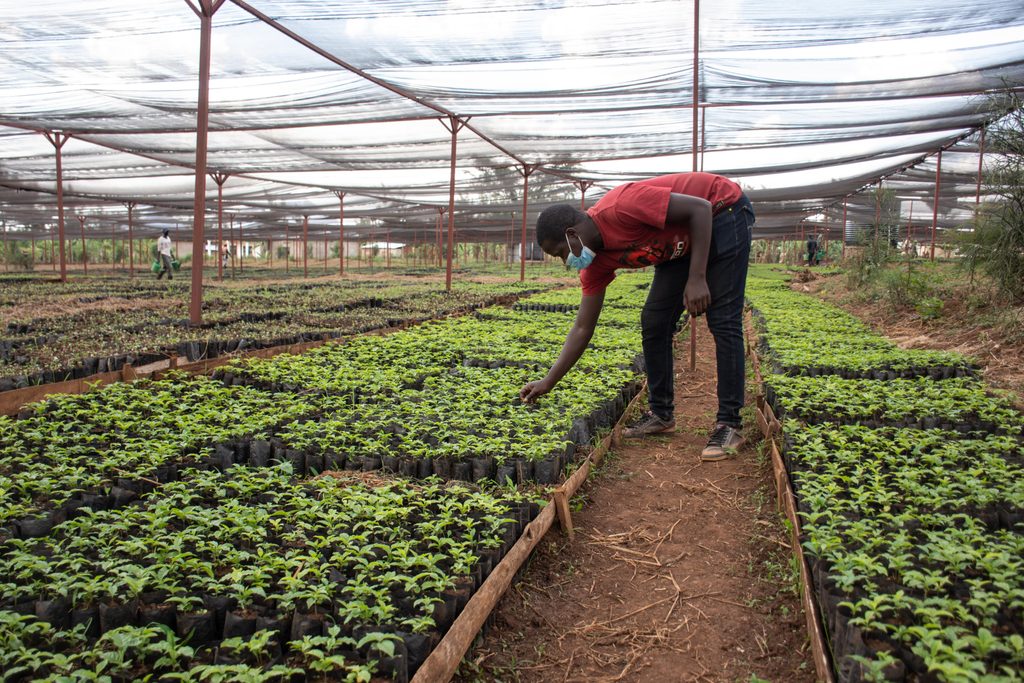
Tree nursery manager – Kayonza nursery, Eastern province, Rwanda
Rwanda – One Acre Fund
Alongside project organizers, One Acre Fund, this project aims to support local biodiversity, help restore degraded land, and provide economic opportunities to historically underserved people in the surrounding communities, especially smallholder farmers who are impacted by the climate change’s most acute effects. SIE’s support will help plant 25,000 trees to replant vital forestland that has been lost across Rwanda.
Madagascar – Forest Habitats
Arbor Day Foundation is working with the Madagascar Biodiversity Partnership to tackle the significant decline in Madagascar’s tree cover. This project incentivizes tree planting and thoughtful forestry practices through a multi-benefit system that provides quality jobs and resources to local people. In addition to the economic benefits, this project supports critically endangered species – particularly lemurs – by reconnecting their once-isolated habitats through reforested corridors. SIE’s commitment will help incentivize the planting of another 25,000 more trees for this program.
WWFOpens an external website
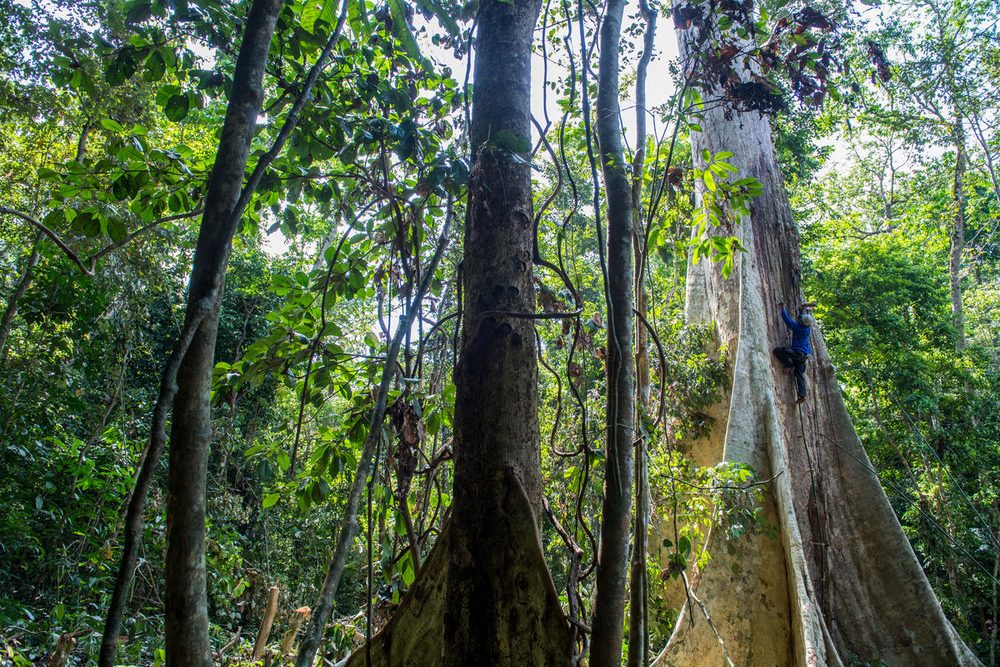
Member of the indigenous Talang Mamak community climbs a tree to gather honey
Indonesia – Thirty Hills Wildlife Program
“Thirty Hills,” is the largest block of lowland forest still intact in central Sumatra, Indonesia, with some of the last habitat for critically endangered Sumatran elephants, orangutans and tigers. WWF and partners are actively managing a 100,000-acre rainforest to prevent it from being clear cut, creating agroforestry programs that benefit local communities and conducting forest patrols and biodiversity monitoring. SIE’s support will help increase camera trap monitoring and expand WWF’s human-wildlife conflict management efforts.
Africa – Unganisha
The Unganisha natural region is one of Africa’s most valuable and globally important natural landscapes, and includes eight globally important protected areas, including the Serengeti and Kilimanjaro National Parks. SIE’s donation will support WWF’s ambitious project to enable nature conservation across borders. Together with local communities and many other partners, projects in the region include anti-poaching work, preventing human-wildlife conflicts, biodiversity monitoring, enabling sustainable livestock farming and creating opportunities for alternative sources of income.
We look forward to providing updates and images of these projects soon.
Reducing plastic in our packaging. We continue to make progress towards our targets to eliminate plastic packaging from newly designed smaller products and decrease the amount of plastic packaging used for other products by 10%. New products released in FY2023 use 95-100% fiber-based packaging solutions (by weight), depending on the product1, whilst at launch in 2020 the PS5 console and accessories packaging was between 93-99% fiber-based. With the release of the latest PlayStation 5 model, the plastic carrying handle was removed and for our other products we have made efforts to find alternatives to using traditional plastic hanger tabs; all newly released smaller PlayStation products in FY23 use paper-based hang tabs (where applicable)2. In addition, two of these products (PlayStation Link USB adapter, PULSE Explore wireless earbuds) use 100% fiber-based packaging. We continue to investigate suitable plastic packaging alternatives where they remain being used, typically for the necessary protection of our products.
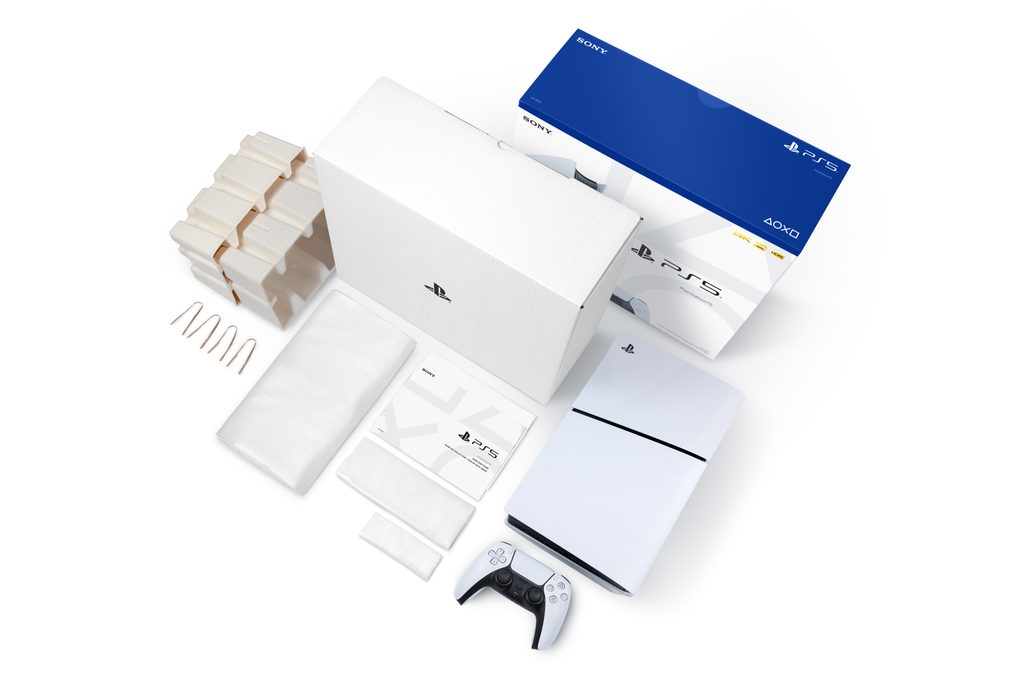
Use of recycled plastics in our products. The average recycled PP from post-industrial waste used in our game boxes has increased from 14% in FY22, to 21% in FY23 globally. We continue to investigate opportunities to use recycled plastics in our products and will continue to report on our progress.
We’ve taken steps to reduce the amount of automatic game updates sent through PlayStation Network. In 2023 we implemented some changes to how we send game patch updates to your PS5 console. Thanks to our Machine Learning technology, users who enable internet connection in Rest Mode now receive updates more efficiently than before. This should help optimize the amount of data we send through internet networks worldwide and may reduce your broadband load3.
Continuing to support transition to renewable electricity. We continue to work with data centers that house our game streaming servers to ensure their facilities meet the latest efficiency benchmarks, while encouraging them to transition to renewable electricity consumption wherever possible as our streaming services expand. In 2023, 81% of the electricity used for streaming PlayStation games came from renewable and low carbon sources4 compared to 78 – 83% in previous years. In addition to that, we purchased offsets from the Gold Standard equivalent to carbon emissions calculated from the remaining 19%5. In addition, our major HQ office sites in the US, UK, and Japan used 100% renewable energy in 2023.
In FY2023 we implemented several office and employee engagement initiatives. Our offices worldwide are making progress to reduce single-use plastic items wherever possible. Our employee cafe in Liverpool has kept its 100% no single-use item status, while our London office has removed all disposable coffee cups and plastic smoothie cups. All packaging items in our San Mateo cafe are compostable, and our Tokyo office has also stopped providing single-use plastics in both cafes and conference rooms.
SIE encouraged staff engagement in environmentally conscious food choices throughout the year. SIE Japan staff cafes coordinated a sustainable food campaign exploring alternative sources of protein such as insects and other alternatives to meat.
Our employee volunteer programme continued with global participation in a range of beach clean ups and conservation activities over the past year. We give thanks to our partners including, Vinters Valley, Eden Project, The Friends of Tower Hamlets Cemetery Park in the UK, as well as the Surfrider Foundation and I Love a Clean San Diego in the US.
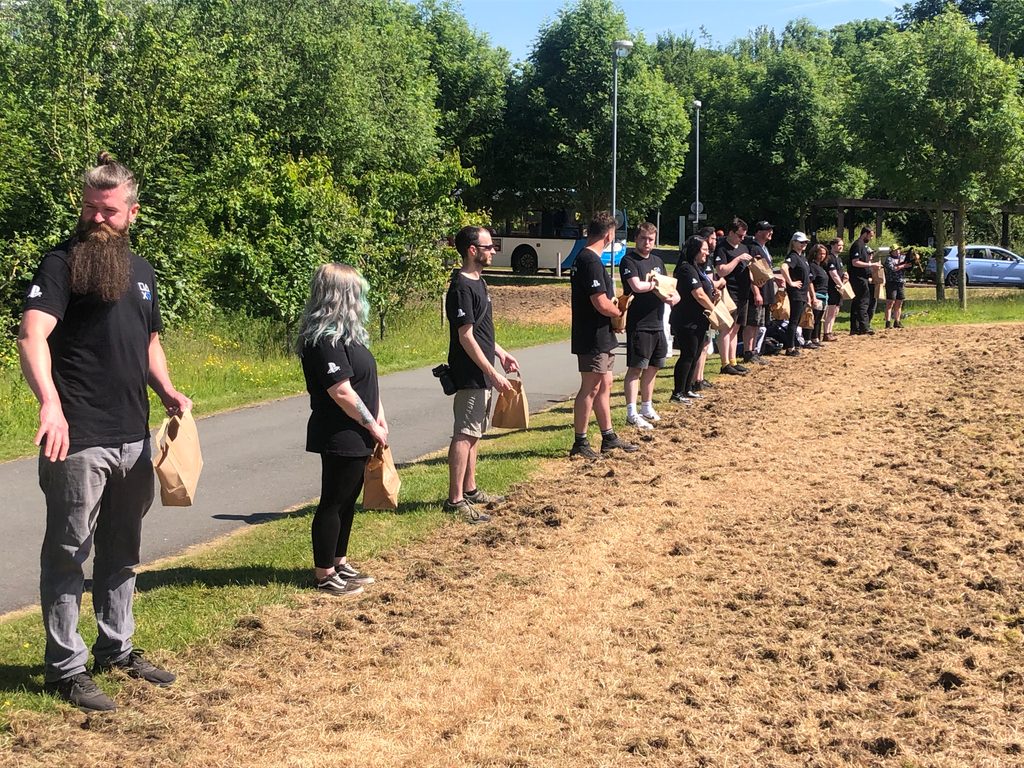
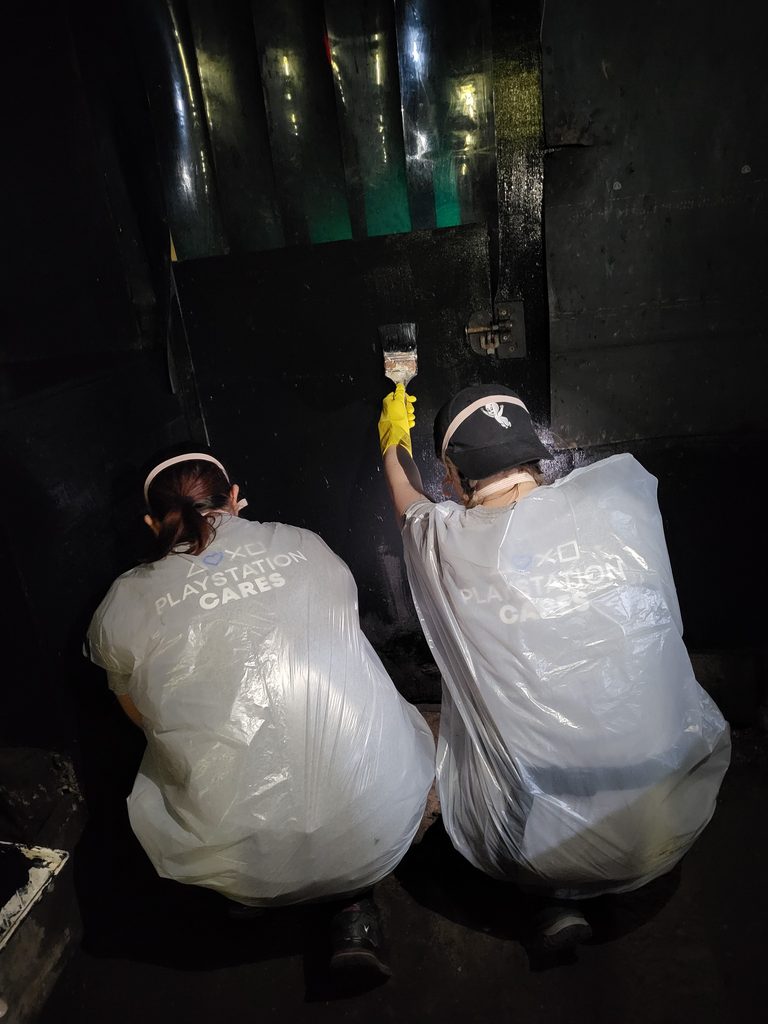
We continue to monitor greenhouse gas emissions from product use. We estimate that we are on target to achieve a 45% reduction in carbon emissions from product use by FY2035 compared to our FY2018 baseline, due to the projected transition of global electricity production to renewable and low carbon energy sources and our efforts to improve console energy efficiency. For more information on our organizational impact and our Science Based Targets initiative approved commitment to achieve net-zero emissions by 2040 see the Sony Sustainability Report 2023.
Our focus is to inspire change and drive progress to create impact beyond gaming. We aim to forge a path to address our specific environmental and social impacts; to turn our intentions into action; and to do the right things and do them well.
There is certainly much more work to do, and we will continue to share our progress.
- New products released in FY2023 (percentage of fiber-based packaging by weight) include: PS5™ Console Covers (model group – slim) (95%), PlayStation Link™ USB adapter (100%), PULSE Elite™ wireless headset (99.8%), PULSE Explore™ wireless earbuds (100%), PlayStation Portal™ Remote Player (99.6%), Access™ controller (99%), Disc Drive For PS5® Digital Edition Consoles (98%), Vertical Stand for PS5® Consoles (98%), PlayStation®5 Console (model group – slim) (98%) and PlayStation®5 Digital Edition Console (model group – slim) (97%). Packaging weight data for calculations based on models sold in Europe. ↩︎
- Newly released smaller PlayStation products with paper-based hanger tabs in FY23 include: PlayStation Link™ USB adapter, PULSE Elite™ wireless headset, PULSE Explore™ wireless earbuds, Access™ controller, Disc Drive For PS5® Digital Edition Consoles and Vertical Stand for PS5® Consoles. ↩︎
- Depending on use. ↩︎
- This approach to calculating emissions is based on guidance from the Greenhouse Gas Protocol Corporate Standard. ↩︎
- Offsets from the Gold Standard for 2023 equal to 6,681tCO2e ↩︎


